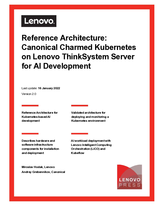Updated
16 Jan 2022Form Number
LP1415PDF size
47 pages, 1.4 MBAbstract
This document describes the reference architecture (RA) for Canonical Ubuntu Kubernetes for AI on Lenovo ThinkSystem infrastructure. The intended audience for this document is technical IT architects, system administrators, and managers who are interested in executing Machine Learning/Artificial Intelligence (ML/AI) development workloads on a Kubernetes-based cluster. The RA provides a technical overview of the hardware and software configurations needed for deployment, and explains why the combination of Lenovo servers and Canonical Charmed Kubernetes provides a flexible, best of breed solution for executing Kubernetes-based AI workloads.
This document includes an overview of the business problem and business value that is addressed by Canonical Ubuntu Kubernetes. A description of customer requirements is followed by an architectural overview of the hardware and software solution components, and the operational model for lifecycle management of the Kubernetes cluster. Workload deployment platform options are provided to address end-user requirements for ML/AI workload deployment.
Table of Contents
Introduction
Business problem and business value
Requirements
Architectural overview
Component model
Operational model
Deployment considerations
Appendix: Lenovo Bill of materials
Resources
To view the document, click the Download PDF button.
Change History
Changes in the January 16, 2022 update:
- Update to latest hardware and software versions
- Software: 20.04.3 LTS (Linux Kernel 5.4), Kubernetes 1.21, MAAS 2.9, Juju 2.9.21
- Hardware: Lenovo ThinkSystem SR630 V2, Lenovo ThinkSystem SR650 V2, NVIDIA A100 GPUs
- Updated procedure and tools to reflect the latest hardware and software
Configure and Buy
Full Change History
Course Detail
Employees Only Content
The content in this document with a is only visible to employees who are logged in. Logon using your Lenovo ITcode and password via Lenovo single-signon (SSO).
The author of the document has determined that this content is classified as Lenovo Internal and should not be normally be made available to people who are not employees or contractors. This includes partners, customers, and competitors. The reasons may vary and you should reach out to the authors of the document for clarification, if needed. Be cautious about sharing this content with others as it may contain sensitive information.
Any visitor to the Lenovo Press web site who is not logged on will not be able to see this employee-only content. This content is excluded from search engine indexes and will not appear in any search results.
For all users, including logged-in employees, this employee-only content does not appear in the PDF version of this document.
This functionality is cookie based. The web site will normally remember your login state between browser sessions, however, if you clear cookies at the end of a session or work in an Incognito/Private browser window, then you will need to log in each time.
If you have any questions about this feature of the Lenovo Press web, please email David Watts at dwatts@lenovo.com.

